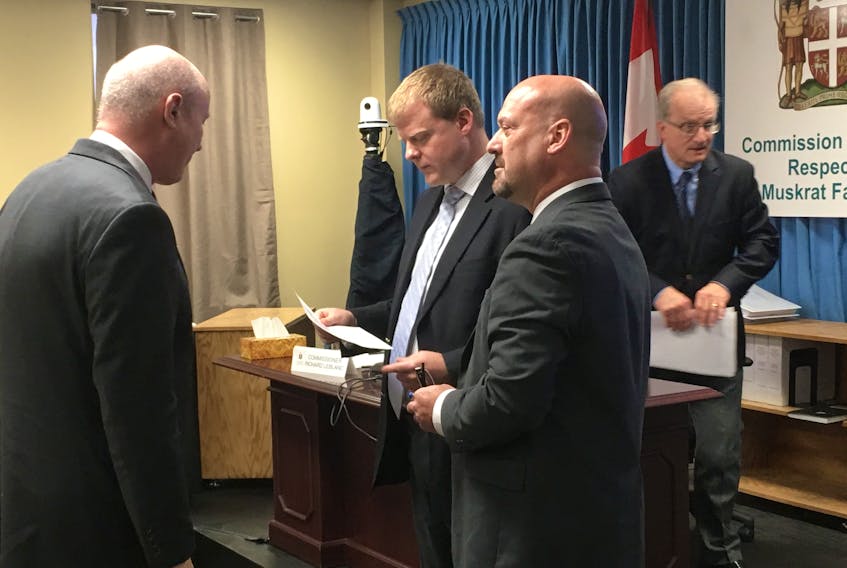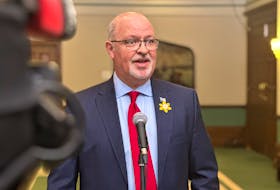An associate deputy minister inside the Department of Natural Resources in 2012, Charles Bown worked on the Muskrat Falls issue for years and says the Government of Newfoundland and Labrador could have had an independent, up-to-date report on estimated project costs — including any and all risks — before final debate and sanctioning, but they chose not to ask for it.
On Wednesday afternoon, Bown told the Muskrat Falls Inquiry time pressures led to instructions to bureaucrats, including himself, to limit the work of Manitoba Hydro International (MHI). A “risk analysis review” in an early draft of their contract was later dropped.
“Politically, there was a time schedule to have a debate in the House (of Assembly in June). The premier had committed to do that and even presumably in order to have a debate you had to have the most recent, most up-to-date information."
— Charles Bown
“There was also some project pressure that there was certain elements of the project that needed to get done and that we were on schedule for project sanction to start at a certain period of time, so we needed to stick to that schedule,” he said.
Bown said the pressure was coming from within the government and from the hydroelectric power project’s proponent, Nalcor Energy.
Referencing handwritten notes now in evidence, from former natural resources minister Jerome Kennedy, Bown said there was a meeting on April 6, 2012 involving himself, Kennedy, Nalcor Energy president and CEO Ed Martin, the premier’s chief of staff Brian Taylor, clerk of the executive council Robert Thompson and Glenda Power, who worked in communications for the premier’s office.
Bown said he doesn’t recall what exactly was said, but he has no doubt there was detailed discussion of the proposed MHI “cold eyes” review, timelines and not including risk analysis.
“Was Mr. Kennedy fine with that?” asked inquiry co-counsel Barry Learmonth.
“I don’t recall,” Bown said.
He also couldn’t recall if there was any protest — calls internally to just push the project timeline and House debate to allow the cost review work as originally envisioned.
Bown made reference to an internal email of the Nalcor Energy project team, in which Paul Harrington also spoke about limiting the MHI review, “in order for this to be performed in the time available.”
Bown suggested it was evidence of the time pressure.
Learmonth asked, “So government’s response was, ‘That’s fine. We have to meet the June 15 deadline, so if the risk analysis (in the Manitoba Hydro International contract) has to go out the window, so be it?’”
Bown answered, “That’s the decision that was made.”
Learmonth asked why there was any rush, since the political debate was being decided by the government, and Nalcor Energy was a Crown corporation.
“Mr. Learmonth, that’s a political question. I can’t answer what the motivation was. It would be best asked to the premier — or (correcting for accuracy, former premier) Ms. Dunderdale,” he said.
Later debate
The political timeline shifted regardless. In late April 2012, the premier told reporters the planned June debate would be pushed back to September or October. The MHI contract was not changed.
Part of the reasoning offered by Dunderdale for the move of the debate was that she did not want to rush the final project numbers and the MHI review. She also wanted to allow enough time for the political opposition to properly review the information to be made public before the debate.
The Liberals said at the time they weren’t forcing any delay, concerned with the perception. And then-NDP leader Lorraine Michael said she was pleased the debate schedule had been revisited, feeling the premier was imposing “artificial” deadlines.
“I had a firm belief that we were receiving all of the information on costs.”
— Charles Bown
Bown testified that when project risk was discussed leading up to the project’s green light, it was a generic term and not broken down to “strategic risk” or “tactical risk.”
He testified he heard about an earlier, $497-million estimate by Westney Consulting of strategic risk not in the cost estimate when he saw a report for the inquiry, from auditors with Grant Thornton. He spoke about it in his interview with inquiry lawyers ahead of his testimony.
“And why were you shocked when you saw it?” Learmonth asked.
“I had a firm belief that we were receiving all of the information on costs,” Bown said.
He said even if Nalcor Energy executives believed the risk was dealt with by the time the project was being debated and sanctioned, it doesn’t excuse government not knowing about it.
Bown’s direct examination by Learmonth is expected to be completed Thursday. He will then be open to cross-examination from the lawyers for the various parties with standing, including his own lawyer. He is the last witness scheduled for the week.
RELATED STORIES:









